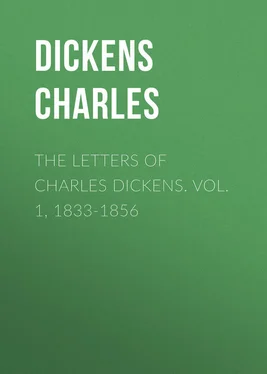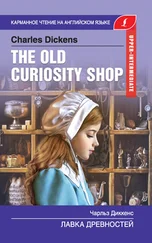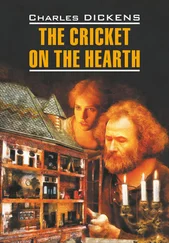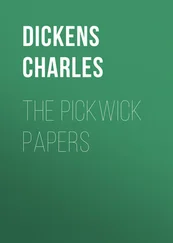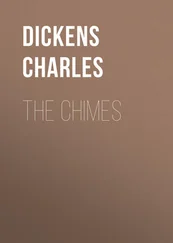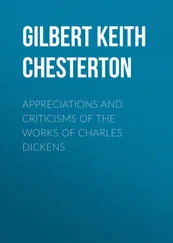Чарльз Диккенс - The Letters of Charles Dickens. Vol. 1, 1833-1856
Здесь есть возможность читать онлайн «Чарльз Диккенс - The Letters of Charles Dickens. Vol. 1, 1833-1856» — ознакомительный отрывок электронной книги совершенно бесплатно, а после прочтения отрывка купить полную версию. В некоторых случаях можно слушать аудио, скачать через торрент в формате fb2 и присутствует краткое содержание. Жанр: foreign_antique, foreign_prose, на английском языке. Описание произведения, (предисловие) а так же отзывы посетителей доступны на портале библиотеки ЛибКат.
- Название:The Letters of Charles Dickens. Vol. 1, 1833-1856
- Автор:
- Жанр:
- Год:неизвестен
- ISBN:нет данных
- Рейтинг книги:5 / 5. Голосов: 1
-
Избранное:Добавить в избранное
- Отзывы:
-
Ваша оценка:
- 100
- 1
- 2
- 3
- 4
- 5
The Letters of Charles Dickens. Vol. 1, 1833-1856: краткое содержание, описание и аннотация
Предлагаем к чтению аннотацию, описание, краткое содержание или предисловие (зависит от того, что написал сам автор книги «The Letters of Charles Dickens. Vol. 1, 1833-1856»). Если вы не нашли необходимую информацию о книге — напишите в комментариях, мы постараемся отыскать её.
The Letters of Charles Dickens. Vol. 1, 1833-1856 — читать онлайн ознакомительный отрывок
Ниже представлен текст книги, разбитый по страницам. Система сохранения места последней прочитанной страницы, позволяет с удобством читать онлайн бесплатно книгу «The Letters of Charles Dickens. Vol. 1, 1833-1856», без необходимости каждый раз заново искать на чём Вы остановились. Поставьте закладку, и сможете в любой момент перейти на страницу, на которой закончили чтение.
Интервал:
Закладка:
Sir,
Permit me to say, in reply to your letter, that you do not understand the intention (I daresay the fault is mine) of that passage in the "Pickwick Papers" which has given you offence. The design of "the Shepherd" and of this and every other allusion to him is, to show how sacred things are degraded, vulgarised, and rendered absurd when persons who are utterly incompetent to teach the commonest things take upon themselves to expound such mysteries, and how, in making mere cant phrases of divine words, these persons miss the spirit in which they had their origin. I have seen a great deal of this sort of thing in many parts of England, and I never knew it lead to charity or good deeds.
Whether the great Creator of the world and the creature of his hands, moulded in his own image, be quite so opposite in character as you believe, is a question which it would profit us little to discuss. I like the frankness and candour of your letter, and thank you for it. That every man who seeks heaven must be born again, in good thoughts of his Maker, I sincerely believe. That it is expedient for every hound to say so in a certain snuffling form of words, to which he attaches no good meaning, I do not believe. I take it there is no difference between us.
Faithfully yours.My dear Jerrold,
Yes, you have anticipated my occupation. Chuzzlewit be d – d. High comedy and five hundred pounds are the only matters I can think of. I call it "The One Thing Needful; or, A Part is Better than the Whole." Here are the characters:
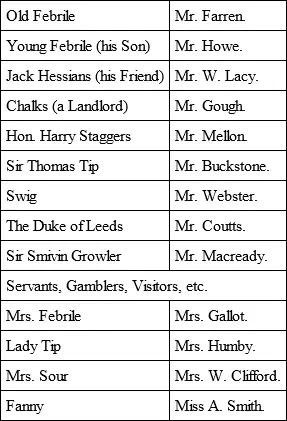
One scene, where Old Febrile tickles Lady Tip in the ribs, and afterwards dances out with his hat behind him, his stick before, and his eye on the pit, I expect will bring the house down. There is also another point, where Old Febrile, at the conclusion of his disclosure to Swig, rises and says: "And now, Swig, tell me, have I acted well?" And Swig says: "Well, Mr. Febrile, have you ever acted ill?" which will carry off the piece.
Herne Bay. Hum. I suppose it's no worse than any other place in this weather, but it is watery rather – isn't it? In my mind's eye, I have the sea in a perpetual state of smallpox; and the chalk running downhill like town milk. But I know the comfort of getting to work in a fresh place, and proposing pious projects to one's self, and having the more substantial advantage of going to bed early and getting up ditto, and walking about alone. I should like to deprive you of the last-named happiness, and to take a good long stroll, terminating in a public-house, and whatever they chanced to have in it. But fine days are over, I think. The horrible misery of London in this weather, with not even a fire to make it cheerful, is hideous.
But I have my comedy to fly to. My only comfort! I walk up and down the street at the back of the theatre every night, and peep in at the green-room window, thinking of the time when "Dick – ins" will be called for by excited hundreds, and won't come till Mr. Webster (half Swig and half himself) shall enter from his dressing-room, and quelling the tempest with a smile, beseech that wizard, if he be in the house (here he looks up at my box), to accept the congratulations of the audience, and indulge them with a sight of the man who has got five hundred pounds in money, and it's impossible to say how much in laurel. Then I shall come forward, and bow once – twice – thrice – roars of approbation – Brayvo – brarvo – hooray – hoorar – hooroar – one cheer more; and asking Webster home to supper, shall declare eternal friendship for that public-spirited individual.
They have not sent me the "Illustrated Magazine." What do they mean by that? You don't say your daughter is better, so I hope you mean that she is quite well. My wife desires her best regards.
I am always, my dear Jerrold, Faithfully your Friend, The Congreve of the Nineteenth Century (which I mean to be called in the Sunday papers).P.S. – I shall dedicate it to Webster, beginning: "My dear Sir, – When you first proposed to stimulate the slumbering dramatic talent of England, I assure you I had not the least idea" – etc. etc. etc.
My dear Stanfield,
I am chairman of a committee, whose object is to open a subscription, and arrange a benefit for the relief of the seven destitute children of poor Elton the actor, who was drowned in the Pegasus . They are exceedingly anxious to have the great assistance of your name; and if you will allow yourself to be announced as one of the body, I do assure you you will help a very melancholy and distressful cause.
Faithfully always.P.S. – The committee meet to-night at the Freemasons', at eight o'clock.
Dear Lord Morpeth,
In acknowledging the safe receipt of your kind donation in behalf of poor Mr. Elton's orphan children, I hope you will suffer me to address you with little ceremony, as the best proof I can give you of my cordial reciprocation of all you say in your most welcome note. I have long esteemed you and been your distant but very truthful admirer; and trust me that it is a real pleasure and happiness to me to anticipate the time when we shall have a nearer intercourse.
Believe me, with sincere regard, Faithfully your Servant.My dear Ainsworth,
I want very much to see you, not having had that old pleasure for a long time. I am at this moment deaf in the ears, hoarse in the throat, red in the nose, green in the gills, damp in the eyes, twitchy in the joints, and fractious in the temper from a most intolerable and oppressive cold, caught the other day, I suspect, at Liverpool, where I got exceedingly wet; but I will make prodigious efforts to get the better of it to-night by resorting to all conceivable remedies, and if I succeed so as to be only negatively disgusting to-morrow, I will joyfully present myself at six, and bring my womankind along with me.
Cordially yours.Pray tell that besotted – to let the opera sink into its native obscurity. I did it in a fit of d – ble good nature long ago, for Hullah, who wrote some very pretty music to it. I just put down for everybody what everybody at the St. James's Theatre wanted to say and do, and that they could say and do best, and I have been most sincerely repentant ever since. The farce I also did as a sort of practical joke, for Harley, whom I have known a long time. It was funny – adapted from one of the published sketches called the "Great Winglebury Duel," and was published by Chapman and Hall. But I have no copy of it now, nor should I think they have. But both these things were done without the least consideration or regard to reputation.
I wouldn't repeat them for a thousand pounds apiece, and devoutly wish them to be forgotten. If you will impress this on the waxy mind of – I shall be truly and unaffectedly obliged to you.
Always faithfully yours.1844
In the summer of this year the house in Devonshire Terrace was let, and Charles Dickens started with his family for Italy, going first to a villa at Albaro, near Genoa, for a few months, and afterwards to the Palazzo Pescheire, Genoa. Towards the end of this year he made excursions to the many places of interest in this country, and was joined at Milan by his wife and sister-in-law, previous to his own departure alone on a business visit to England. He had written his Christmas story, "The Chimes," and was anxious to take it himself to England, and to read it to some of his most intimate friends there.
Читать дальшеИнтервал:
Закладка:
Похожие книги на «The Letters of Charles Dickens. Vol. 1, 1833-1856»
Представляем Вашему вниманию похожие книги на «The Letters of Charles Dickens. Vol. 1, 1833-1856» списком для выбора. Мы отобрали схожую по названию и смыслу литературу в надежде предоставить читателям больше вариантов отыскать новые, интересные, ещё непрочитанные произведения.
Обсуждение, отзывы о книге «The Letters of Charles Dickens. Vol. 1, 1833-1856» и просто собственные мнения читателей. Оставьте ваши комментарии, напишите, что Вы думаете о произведении, его смысле или главных героях. Укажите что конкретно понравилось, а что нет, и почему Вы так считаете.
